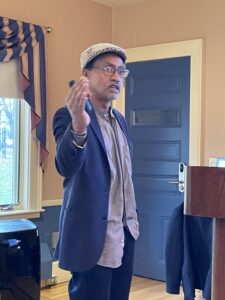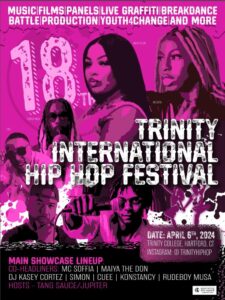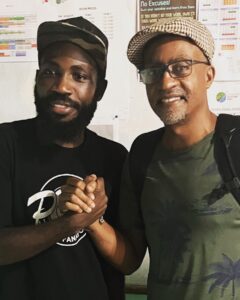 Mead fellow Quin McGlame recently spoke with Professor Markle, Associate Professor of History and International Studies at Trinity College. He also serves as the Faculty Advisor to Trinity’s annual International Hip Hop Festival, being held from April 4-7th.
Mead fellow Quin McGlame recently spoke with Professor Markle, Associate Professor of History and International Studies at Trinity College. He also serves as the Faculty Advisor to Trinity’s annual International Hip Hop Festival, being held from April 4-7th.
While he had a fascination with military history in high school, Professor Markle began to develop an interest in African history while getting his undergraduate degree at Tufts University. He describes this fascination as deriving from an outgrowth of his own identity of what it means to be Black. Prof. Markle then went to get his Ph.D. from NYU, studying Black radical movements of the 19th and 20th centuries. He arrived at Trinity in 2009 and teaches a variety of courses on Africa and the African Diaspora. Additionally, upon coming to Trinity, he began to move into the field of Hip Hop Studies, and has been teaching INTS – 344: Global Hip Hop Cultures since 2014 and routinely teaches FYSM – 138: Archiving Hip Hop. Furthermore, he is currently a consultant to the Hartford Hip Hop Digital Collection at the Hartford Public Library and is working on a book that will examine the transnational history of Tanzanian Hip Hop music and culture from 1984 to 2023.
 Since 2011, Professor Markle has served as the Faculty Advisor to Trinity’s annual International Hip Hop Festival, a role in which that he takes tremendous pride while acknowledging that the event is entirely student-organized. The festival, founded by Trinity students in 2006, is a weekend-long celebration of hip hop and has been run by the student group of Trinity College’s Temple of Hip Hop Chapter since 2007. The event was organized in response to polarization on campus and it serves as a space for non-violence and to showcase Hip Hop on a global scale allowing freedom of expression through music, dance, graffiti, and street art. Throughout the festival’s three days, there are lectures, panels, film screenings, and concerts featuring groups from around the world and the local Hartford community. The festival’s theme this year is “Underrepresentation” which Professor Markle wants to be left for personal interpretation and will include artists from Brazil, Senegal, and the Dominican Republic.
Since 2011, Professor Markle has served as the Faculty Advisor to Trinity’s annual International Hip Hop Festival, a role in which that he takes tremendous pride while acknowledging that the event is entirely student-organized. The festival, founded by Trinity students in 2006, is a weekend-long celebration of hip hop and has been run by the student group of Trinity College’s Temple of Hip Hop Chapter since 2007. The event was organized in response to polarization on campus and it serves as a space for non-violence and to showcase Hip Hop on a global scale allowing freedom of expression through music, dance, graffiti, and street art. Throughout the festival’s three days, there are lectures, panels, film screenings, and concerts featuring groups from around the world and the local Hartford community. The festival’s theme this year is “Underrepresentation” which Professor Markle wants to be left for personal interpretation and will include artists from Brazil, Senegal, and the Dominican Republic.
Professor Markle also highlighted the role of the Hartford community in the planning of the festival and wants the event to be a bridge between Trinity College and the city. The festival acts as a platform for the Hartford hip hop scene and also incorporates local street and graffiti artists. He emphasized the importance of the collaboration effort between the student organizers and Hartford and acknowledged that “without Hartford, there is no festival”. 
When asked to give advice to someone interested in studying History at Trinity, Professor Markle emphasized the advantages the History department at Trinity can offer outside of the classroom including research funding and study away programs. He also highlighted the variety of skills a History degree can provide which can lend itself to a variety of career opportunities.
